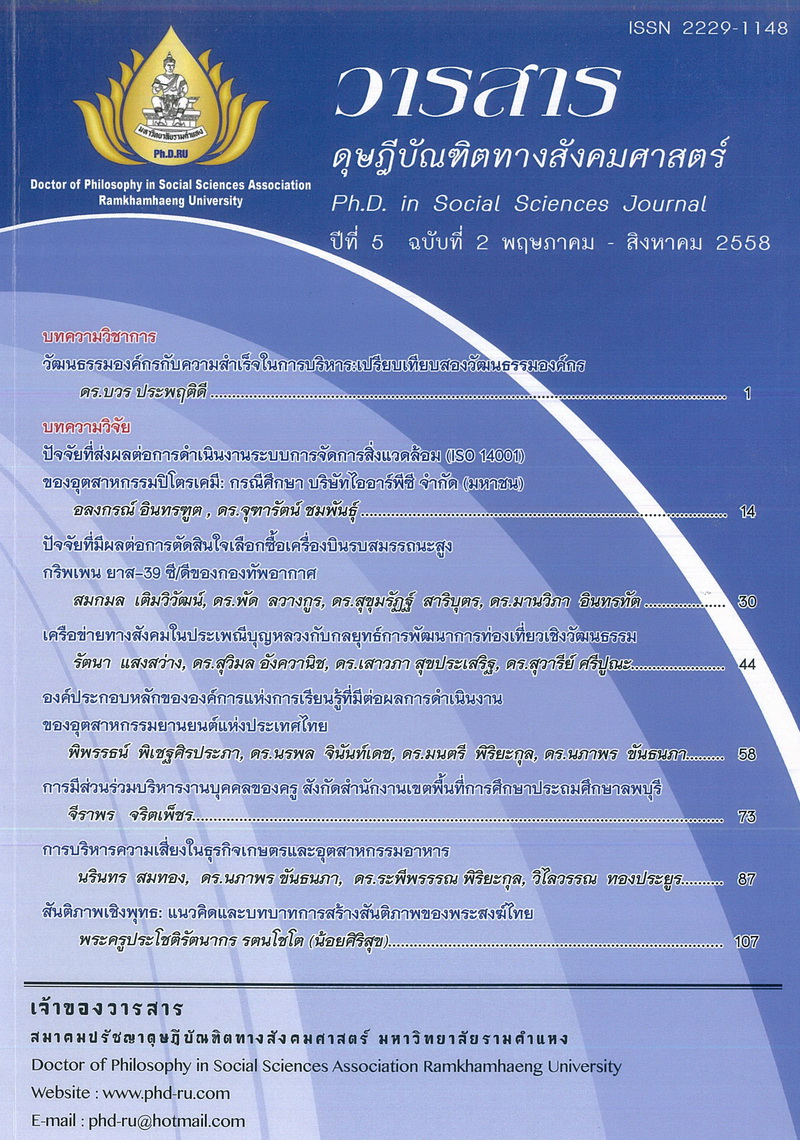องค์ประกอบหลักขององค์การแห่งการเรียนรู้ที่มีต่อผลการดำเนินงานของอุตสาหกรรมยานยนต์แห่งประเทศไทย
Main Article Content
Abstract
MAJOR COMPONENTS OF LEARNING ORGANIZATION IN THE PERFORMANCE OF THE AUTOMOTIVE INDUSTRY IN THAILAND
In this dissertation, the researcher studies (1) organizational culture, organizational competency, human resource management, learning organization in addition to the performance of the automotive industry in the Kingdom of Thailand (Thailand). The researcher also examines (2) factors influencing the performance of the automotive industry in Thailand. Furthermore, the researcher used a mixed-method research approach in carrying out this investigation. In the quantitative phase, the researcher studied a sample population of 500 subjects employed in the Thai automotive industry. The research instrument was a questionnaire. Using techniques of descriptive statistics, the researcher analyzed the data collected in terms of percentage, mean and standard deviation. Adopting the structural equation model, the researcher conducted further analysis by virtue of applying the structural equation model through the agency of the partial least square graph (PLS-Graph) 3.0 computer software program. In the qualitative research phase, the researcher conducted semi-structured in-depth interviews with sixteen experts who were executives and supervisors at eleven companies. Findings from the quantitative research phase showed that the organizational performance, learning organization, human resource management, organization competency, and organization culture displayed a total mean at a high level. And in analyzing factors influencing organizational performance, the researcher found the following. Organizational culture displayed direct influence on organizational competency (TE [total effects] = 0.719), learning organization (TE=0.455), and human resource management (TE=0.759). Organizational culture also exhibited indirect influence on organizational performance (TE=0.883). In addition, learning organization (TE=0.255) and human resource management (TE=0.600) evinced direct influence on organizational performance. Moreover, organizational competency (TE=0.069) and organizational cultures (TE=0.883) manifested indirect influence on organizational performance, a finding which was in consonance with the hypotheses postulated for this inquiry at the statistically significant level of 0.01. In regard to the qualitative research phase, the researcher found that the conclusions derived from the in-depth interviews were congruent with the results of the quantitative research phase in the aspects. Finally, the research made use of grounded theory in providing supplementary support for the aforementioned research results.
Article Details
Academic articles, research articles, and book reviews in the Ph.D. in Social Sciences Journal are author’s opinions, and not the publisher’s, and is not the responsibility of the Ph.D. in Social Sciences Journal Philosophy Association, Ramkhamhaeng University. (In the case that research is done on human, the researcher has to be trained in Ethics for Doing Research on Human Training and has to produce the evidence of the training).


